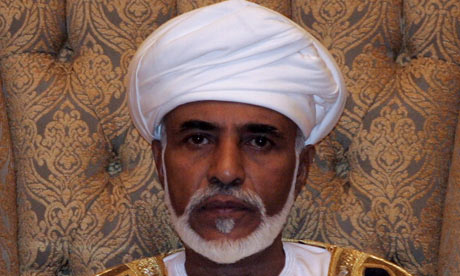By Justin Dorman
Impunity Watch Reporter, Middle East
MUSCAT, Oman – While the Arab spring led to protests throughout the Middle East, those in Oman have felt it necessary to join in over the past year. As a result of expressing their displeasure with the government and the Sultan, numerous individuals have been detained and imprisoned for their roles and statements made in protests and cyber campaigns.

Many of those detained, were jailed specifically for defaming the sultan. The seventy-two year old Sultan Qaboos bin Said, who has ruled over Oman for the last forty-two years, does not hold too big of a grudge though. The Oman News Agency announced that, “Sultan Qaboos has issued a royal pardon for those convicted of defamation, information technology crimes and unauthorised rallies.” At least fifty individuals who were sentenced from six to eighteen month jail terms are expected to be released today.
This decision to free all the activists was not completely unprovoked. The sultans pardon came shortly after the negative publicity that arises when approximately thirty detained individuals partake in a two week long hunger strike. The hunger strike began when eleven to seventeen cyber activists chose to protest the delays and denials of receiving appeals. These cyber activists were charged with “unlawful assembly and violating the cyber law.” Eventually, another thirteen imprisoned activists joined their hunger strike.
After fifteen days of not eating, the initial cyber activist hunger strikers were told by the Supreme Court that their appeals would in fact be heard. Just a week later, Sultan Qaboos bin Said announced his royal pardons.
Besides for calling for the release of these protesters, the Sultan is also attempting to respond to many of their concerns. One move the government has taken was to announce a plan to restrict the number of foreign workers in the country in order to decrease domestic employment. Additionally, plans are in the works to greatly increase the minimum wage.
While these improvements sound good on paper, the protesters will not be truly happy until they see they see actual actions taken. There has long been a pledge to increase public specter jobs which has never really come to fruition as the country focuses on its oil export role on the Strait of Hormuz. Until actual change comes, expect more to be detained for defamation against sultan, and eventually more pardons as well.
For further information, please see:
Guardian – Oman’s Sultan Pardons Dissidents who Were Jailed for Defaming him – 22 March 2013
Gulf News – Oman’s Qaboos Pardons Activists – 21 March 2013
Middle East Online – Top Court in Oman Orders Retrial for Jailed Activists – 4 March 2013
Daily News Egypt – 30 Jailed Omani Activists end Hunger Strike: Lawyer – 25 February 2013



